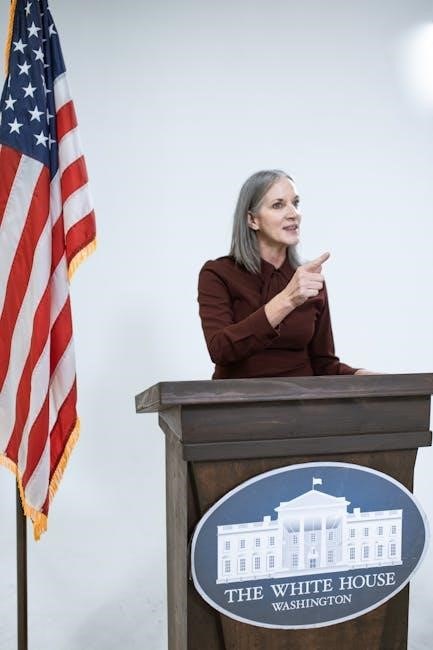Elie Wiesel’s Nobel Peace Prize acceptance speech, delivered in 1986, is a powerful testament to his advocacy for human rights and justice. Available as a PDF, the speech highlights his experiences as a Holocaust survivor and his commitment to combating global injustices. Wiesel’s eloquence and moral urgency continue to inspire peace activism worldwide, making his speech a vital resource for understanding the fight against oppression and the importance of collective action. His words remain a beacon of hope and a call to remember the past while striving for a just future. The speech can be accessed on platforms like NobelPrize.org and educational resources, ensuring its legacy endures for generations.
Background on Elie Wiesel and the Nobel Peace Prize
Elie Wiesel, a Holocaust survivor and renowned author, was awarded the Nobel Peace Prize in 1986 for his tireless advocacy for human rights and peace. Born in 1928, Wiesel survived Auschwitz and dedicated his life to combating injustice and promoting tolerance. His literary works, including Night, shed light on the horrors of the Holocaust. The Nobel Committee recognized him as a “messenger to mankind,” honoring his efforts to raise awareness about global injustices and inspire collective action for humanity’s sake.
Significance of Elie Wiesel’s Nobel Prize Speech
Elie Wiesel’s Nobel Prize speech holds profound significance as a call to action against global injustices. It underscores the importance of remembering the Holocaust and combating oppression. Wiesel’s words inspire humanity to fight for justice and uphold human dignity. The speech, available as a PDF, serves as a timeless reminder of the moral responsibility to act against suffering. Its availability on platforms like NobelPrize.org ensures its message reaches future generations, fostering a commitment to peace and human rights.
Overview of the Speech’s Key Themes
Elie Wiesel’s Nobel Prize speech revolves around themes of hope, despair, and memory, emphasizing the importance of learning from the Holocaust. He highlights the plight of victims of hunger, racism, and political persecution, citing examples from Chile and Ethiopia. Wiesel underscores the moral obligation to fight injustice and the power of collective action. His speech also explores the interplay between individual responsibility and societal change, urging humanity to act against oppression and preserve the dignity of all people.

The Speech’s Historical Context
Elie Wiesel delivered his Nobel Peace Prize speech in Oslo City Hall in 1986, marking 90 years since Alfred Nobel’s death, highlighting global injustice and human rights.
Elie Wiesel’s Journey to the Nobel Peace Prize
Elie Wiesel’s path to the Nobel Peace Prize was marked by his unwavering advocacy for human rights and Holocaust remembrance. As a Holocaust survivor, his experiences shaped his mission to combat injustice and promote peace. Wiesel’s literary work and activism earned him global recognition, culminating in the Nobel Peace Prize in 1986. His speech emphasized the collective responsibility to fight oppression, reflecting his lifelong dedication to justice and humanity.
The Year 1986 and Its Global Significance
1986 marked a pivotal year globally, with events shaping international relations and human rights discussions. The Cold War persisted, while movements for democracy and justice gained momentum. Technological advancements and cultural shifts, such as the rise of personal computers and the approach of Halley’s Comet, captivated the world. Against this backdrop, Elie Wiesel’s Nobel Peace Prize speech resonated deeply, addressing global injustices and inspiring collective action. His message of hope and accountability aligned with the era’s evolving consciousness, making his speech a timeless call to humanity.
The Venue: Oslo City Hall, Norway
Elie Wiesel delivered his Nobel Peace Prize acceptance speech in Oslo City Hall, Norway, on December 10, 1986. This historic venue, known for its grand architecture and cultural significance, has hosted the Nobel Peace Prize ceremonies since 1947. The hall’s ornate design and majestic atmosphere provided a fitting backdrop for Wiesel’s powerful address, emphasizing the gravity of his message. Its location in Norway, a nation renowned for its commitment to peace, underscored the global importance of the event.

Key Themes in the Speech
Elie Wiesel’s speech emphasizes human rights, social justice, and the Holocaust’s legacy. He explores hope, despair, and the power of memory to inspire action against injustice.
Human Rights and Social Justice
Elie Wiesel’s speech underscores the urgency of addressing human rights violations and social injustice globally. He highlights the suffering of victims of hunger, racism, and political persecution, emphasizing the need for collective action to combat these issues. Wiesel calls on individuals and societies to stand against oppression, advocating for the protection of the vulnerable. His words resonate as a powerful reminder of humanity’s responsibility to uphold dignity and justice for all, inspiring global efforts to eradicate inequality and promote peace.
The Holocaust and Its Legacy
Elie Wiesel’s Nobel Peace Prize speech profoundly reflects on the Holocaust, a defining experience that shaped his advocacy for peace and justice. He refers to the Holocaust as a “kingdom of night,” symbolizing unimaginable suffering and the destruction of millions. Wiesel emphasizes the importance of remembering the victims and learning from the past to prevent future atrocities. His speech serves as a powerful reminder of the Holocaust’s legacy, urging humanity to confront hatred and work toward reconciliation and peace.
Hope, Despair, and Memory
Elie Wiesel’s speech masterfully balances hope and despair, emphasizing the enduring power of memory. He reflects on the Holocaust’s darkness, yet underscores hope as a resilient force for humanity. Wiesel urges remembrance not for its pain, but to honor the victims and prevent future atrocities. His words bridge the past and future, calling for collective action to combat injustice and foster peace. Memory, he argues, is both a burden and a catalyst for change, inspiring hope in the face of despair.

Emotional and Philosophical Undertones
Elie Wiesel’s speech conveys profound emotional duality, blending fear and gratitude. He reflects on the “kingdom of night,” symbolizing the Holocaust’s horrors, while emphasizing hope and humanity’s moral responsibility.
Elie Wiesel’s Mixed Emotions on Receiving the Prize
Elie Wiesel expressed a profound mix of emotions upon receiving the Nobel Peace Prize. He admitted feeling both frightened and pleased, acknowledging the weight of responsibility it entailed. The honor transcended him, reflecting a broader recognition of humanity’s struggles. Wiesel’s fear stemmed from the burden of representing the voices of the oppressed, while his pleasure arose from the global acknowledgment of his lifelong advocacy. His emotional duality underscored the gravity of the prize and its significance in amplifying his message of justice and hope.
The Concept of “Kingdom of Night”
Elie Wiesel’s “Kingdom of Night” refers to the Holocaust, symbolizing the profound darkness and atrocities endured during the genocide. In his Nobel speech, he evokes this concept to highlight humanity’s capacity for evil and the enduring scars left by such events. The phrase serves as a reminder of the horrors of the past, urging collective vigilance against injustice and oppression. Wiesel’s use of “Kingdom of Night” emphasizes the moral obligation to combat darkness and foster hope and humanity in its place.
The Role of Humanity in Combating Injustice
Elie Wiesel emphasizes humanity’s moral responsibility to confront injustice. In his speech, he asserts that individuals must act as voices for the voiceless and stand against oppression. Wiesel calls on humanity to transcend indifference, advocating for collective action to address global injustices such as hunger, racism, and political persecution. He underscores the importance of empathy and solidarity, urging people to recognize that the freedom and dignity of others are intertwined with their own. This message underscores the power of human agency in fostering justice and peace.

Global Injustices Addressed
Elie Wiesel highlights global injustices, including hunger, racism, and political persecution, citing examples from Chile and Ethiopia. He emphasizes the suffering of marginalized communities worldwide.
Victims of Hunger and Political Persecution
Elie Wiesel draws attention to the plight of victims of hunger and political persecution, emphasizing their suffering and the urgency of global action. He specifically mentions Chile and Ethiopia, highlighting the widespread injustice faced by marginalized communities. Wiesel calls for collective responsibility, urging the world to acknowledge and alleviate their pain. His speech underscores the moral obligation to act against such injustices, stressing that indifference only perpetuates suffering. Awareness and action, he argues, are essential to fostering a more just world.
Racism and Its Impact on Global Peace
Elie Wiesel addresses racism as a profound threat to global peace, asserting that it perpetuates division and violence. He emphasizes the moral imperative to confront racial discrimination worldwide, highlighting its destructive effects on humanity. Wiesel’s speech challenges societies to recognize the inherent dignity of all individuals, advocating for unity and justice. By condemning racism, he underscores the necessity of collective action to dismantle systems of oppression and foster a more equitable world.
Specific Examples from Chile and Ethiopia
Elie Wiesel highlighted the plight of victims in Chile and Ethiopia, emphasizing their suffering under oppressive regimes. In Chile, political persecution and human rights abuses were rampant, while Ethiopia faced devastating hunger and poverty. These examples underscored the urgent need for global attention and action. Wiesel’s speech used these cases to illustrate the widespread nature of injustice and the moral obligation to intervene, advocating for solidarity and compassion to address such crises effectively.

Call to Action
Elie Wiesel’s speech urges individuals to take responsibility for fighting injustice and oppression. He emphasizes the power of collective action and empowering the voices of the oppressed to create a more just and hopeful future.
Individual Responsibility in Fighting Injustice
Elie Wiesel’s speech underscores the importance of individual responsibility in combating injustice. He calls on everyone to act against oppression, emphasizing that silence perpetuates suffering. Wiesel asserts that individuals must use their voices to advocate for the oppressed, whether through activism or awareness. He believes that personal commitment to justice is essential for creating meaningful change, urging people to recognize the moral duty to stand against injustice and support those in need. His words inspire personal accountability and action.
The Power of Collective Action
Elie Wiesel’s speech highlights the transformative power of collective action in fighting injustice. He emphasizes that united efforts can overcome even the most entrenched oppression. By standing together, individuals amplify their impact, creating a force that challenges systemic inequities. Wiesel urges global solidarity to address issues like hunger, racism, and political persecution, illustrating how collective action fosters hope and drives meaningful change. His message inspires communities to unite for justice, proving that together, humanity can achieve what seems impossible alone.
Empowering the Voices of the Oppressed
Elie Wiesel’s speech underscores the moral imperative to amplify the voices of the oppressed. He advocates for those silenced by injustice, emphasizing that their stories must be heard. By lending our voices to victims of hunger, racism, and persecution, we restore their dignity and challenge systemic oppression. Wiesel calls on individuals and communities to act as advocates, ensuring that the suffering of others is not ignored. This collective effort fosters hope and reignites the fight for justice and human rights globally.

Structure and Delivery of the Speech
Elie Wiesel’s speech begins with humility and gratitude, transitions into emotional appeals for justice, and concludes with hope. The PDF and video versions showcase his impassioned delivery, emphasizing moral urgency and inspiring global action against injustice. His structured approach ensures a powerful and memorable message, resonating with audiences worldwide.
Humility and Gratitude in the Opening
Elie Wiesel’s speech begins with profound humility, as he accepts the Nobel Peace Prize with a deep sense of gratitude. He acknowledges the honor transcends him, expressing both fear and joy at the recognition. Wiesel humbly dedicates the prize to Holocaust survivors and victims of injustice worldwide, emphasizing his role as a voice for the oppressed. His opening words set a reflective tone, highlighting the moral responsibility that accompanies such an esteemed award and inspiring global action for peace and justice.
Emotional Appeal and Moral Urgency
Elie Wiesel’s speech masterfully blends emotional depth with moral urgency. Drawing from his Holocaust experiences, he vividly portrays the “kingdom of night,” evoking a profound sense of empathy. Wiesel urgently addresses global injustices such as hunger, racism, and political persecution, citing examples from Chile and Ethiopia. His impassioned plea for collective action resonates deeply, emphasizing humanity’s responsibility to combat suffering and fight for justice, leaving a lasting impact on peace activism and human rights advocacy worldwide.
Concluding with a Message of Hope
Elie Wiesel’s speech concludes with a powerful message of hope, emphasizing the resilience of the human spirit. Despite the darkness of the Holocaust and global injustices, he underscores the importance of not losing faith in humanity’s capacity for good. Wiesel calls for collective responsibility to fight oppression, urging individuals to act as beacons of hope. His closing words inspire a commitment to justice and compassion, leaving audiences with a renewed sense of purpose and optimism for a better future.
Legacy of the Speech
Elie Wiesel’s speech has left a lasting impact on Holocaust education and peace activism, inspiring future generations to fight injustice and promote human rights globally.
Impact on Holocaust Education and Awareness
Elie Wiesel’s speech profoundly influenced Holocaust education, ensuring survivors’ stories are remembered and honored. It has become a cornerstone in academic curricula, fostering empathy and understanding. The speech’s vivid imagery and moral urgency raise awareness about the atrocities of the Holocaust, encouraging future generations to combat prejudice and indifference. Its accessibility as a PDF resource has made it a vital tool for educators, ensuring Wiesel’s message of remembrance and justice endures. The speech continues to inspire a commitment to peace and human rights, serving as a powerful reminder of history’s lessons.
Influence on Modern Peace Activism
Elie Wiesel’s Nobel Peace Prize speech has become a cornerstone of modern peace activism, inspiring movements worldwide. His impassioned call to action against injustice resonates deeply, motivating activists to address global conflicts and inequalities. The speech’s themes of hope, moral responsibility, and collective action continue to guide peace advocates. Available as a PDF, it remains a vital resource, ensuring Wiesel’s message of compassion and justice endures, influencing future generations of peacebuilders and human rights defenders.
Elie Wiesel’s Continued Advocacy After the Speech
After receiving the Nobel Peace Prize, Elie Wiesel remained a steadfast advocate for human rights and justice. He continued to write extensively, including his memoir Night, and founded the Elie Wiesel Foundation for Humanity to combat indifference and intolerance. His work inspired educational resources, such as those on CommonLit, ensuring his message reached future generations. Wiesel’s unwavering commitment to global peace and justice solidified his legacy as a moral leader and a tireless advocate for humanity.

Accessing the Speech
Elie Wiesel’s Nobel Peace Prize speech is available as a PDF on reliable sources like NobelPrize.org and educational platforms such as CommonLit. Study materials and online archives ensure easy access for research and learning purposes.
PDF Availability and Reliable Sources
Elie Wiesel’s Nobel Peace Prize speech is widely available in PDF format on reputable platforms such as NobelPrize.org and educational websites like CommonLit. These sources provide direct access to the speech, ensuring its authenticity and readability. Additionally, the speech can be found in study materials and online archives, making it easily accessible for educational purposes and personal reflection. Reliable platforms guarantee the integrity of the document, allowing readers to engage with Wiesel’s powerful message without compromise.
Online Platforms Hosting the Speech
Elie Wiesel’s Nobel Peace Prize speech is accessible on various online platforms, including NobelPrize.org, the official Nobel Prize website, and educational platforms like CommonLit. These sites provide direct links to the speech in PDF and other formats, ensuring easy access for readers worldwide. Additionally, academic databases such as JSTOR and Google Scholar host the speech, making it readily available for research and study. These platforms are reliable sources for exploring Wiesel’s timeless message.
Educational Resources and Study Materials
Educators and students can access Elie Wiesel’s Nobel Peace Prize speech through various resources. CommonLit offers the speech as part of its curriculum, accompanied by reading guides and discussion questions. Similarly, The College Board provides study materials that analyze the speech’s themes and rhetorical devices. Additionally, platforms like Quizlet feature flashcards and study aids to help learners engage with the speech’s key concepts and historical context, making it easier to teach and study Wiesel’s profound message.



